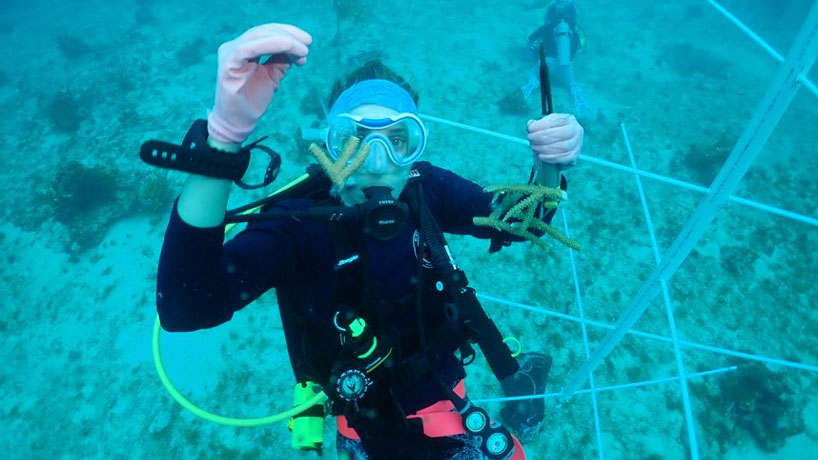
UMSL alumnae Marina Villoch studies coral reef health at Mote Marine Laboratory & Aquarium in the Florida Keys. (Photo courtesy of Marina Villoch)
Marina Villoch has always loved the ocean, and she’s always known she wanted to study marine science when she grew up. But the native of Spain also knew she wanted to complete her studies in the United States, which presented something of a challenge. When a swimming scholarship brought her to the University of Missouri–St. Louis, she decided to shift course – if only for a little while.
“There’s not really marine science, unless you want to dive in the Mississippi River,” she said with a laugh.
At UMSL, Villoch decided to pursue a degree in biochemistry and biotechnology with a minor in chemistry, knowing her studies would give her the tools to succeed in marine work upon graduation. And Villoch certainly stayed busy during her time at UMSL. In addition to the swim team – which she was voted captain of – she was a member of the Pierre Laclede Honors College, a Spanish tutor and a swimming instructor for the Recreation and Wellness Center. She also worked as an undergraduate research assistant studying Alzheimer’s Disease with Professor Michael Nichols for three semesters, which she said introduced her to the experience of working in a lab.
But after graduating with her BCBT degree in 2019, Villoch once again set her sights on marine science. She moved to Florida to start an internship at Mote Marine Laboratory & Aquarium’s Elizabeth Moore International Center for Coral Reef Research & Restoration in the heart of the Lower Keys, and she’s stayed there since. In 2020, she was promoted to coral technician and then became the microbiology and molecular laboratory manager earlier this year.
Specifically, Villoch works with Mote’s Coral Health and Disease Program, which strives to better understand the diseases and other climate change-induced stressors – such as temperature anomalies and ocean acidification – threatening coral reefs.
It’s important work – as Villoch notes in a recent video from In the Know by Yahoo, coral reefs are vital to life both in the ocean and on land.
“Coral reefs provide a lot of ecological services that are beneficial to us humans and the environment,” she told UMSL Daily. “For example, they protect our shorelines from hurricanes and tropical storms; if we don’t have that structure that the coral reef provides, it’s going to harm our coasts. They also serve as nursing ground for a lot of fish and other organisms, they are hotspots of biodiversity, and they contribute to the nutrient cycle. They also bring millions of dollars each year to the economy; a lot of people come down here to Florida every year to fish and snorkel and scuba dive.”
In order to learn more about coral diseases, which are one of the greatest threats to reefs across the Caribbean, Villoch and her colleagues conduct field surveys, experiments, laboratory assays and molecular applications. Day to day, much of her work involves DNA and RNA extractions for microbiome analysis, genotyping and gene expression of corals. Villoch also uses Mote’s Climate and Ocean Acidification Simulator (CAOS) System to run experiments and test how a coral might react to, say, ocean warming conditions brought on by climate change.
“We do a lot of microbiome work,” Villoch said. “Similar to the microbiome in our gut, corals also have a microbiome, meaning all of the bacteria associated with that coral. Some of these bacteria are good bacteria and contribute to the coral health and some of the bacteria are bad bacteria, or pathogens, and make the coral sick. We do a lot of studies because we don’t know a lot about these bacteria, so we’re trying to figure out what makes the coral happy and what makes it stressed.”
Villoch and the team at Mote are also working to restore the coral reef tract in Florida. To help them do so, they upkeep a genetic inventory of the corals they have onsite – which can be difficult to distinguish among the hundreds of different genotypes within a species – to help the coral successfully reproduce and, in turn, become self-sustaining.
“Unlike other organisms where reproduction is based on age, in corals, it’s based on size,” Villoch said. “If you have a big colony, that means it will be able to sexually reproduce. Our goal is to put corals out in the reef that we know are going to be able to fuse and make big colonies so they can reproduce on their own, and then the reef can be sustained by itself.”
Learn more about Villoch’s work in this video.














